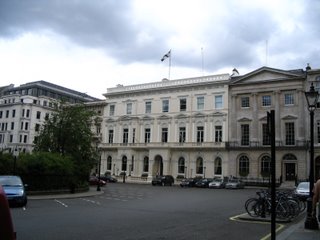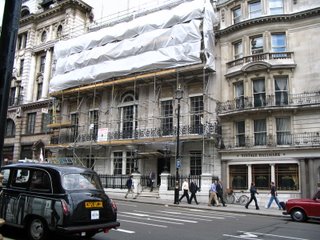On a recent visit to England, DH and I traveled up to London from one of the villages in Kent on the train. I must say I was pleasantly surprised at how clean modern and efficient it all was. It was certainly a far cry from the day when I used to travel to the City to work every day. Mind you, we did take advantage of the cheap day ticket, traveling up at back to Victoria in between the rush hours.
 We planned our route through the St. James area, the area most frequented by men in the Regency era using “Georgette Heyer’s Regency England” by Teresa Chris, a wonderfully vivid description with references to all Ms. Heyer’s beloved characters and a walking tour of London. I highly recommend this reference work if you can find it. As you can see, it was an overcast day, and we felt the occasional rain drop. This sky is so typical of England in the Spring.
We planned our route through the St. James area, the area most frequented by men in the Regency era using “Georgette Heyer’s Regency England” by Teresa Chris, a wonderfully vivid description with references to all Ms. Heyer’s beloved characters and a walking tour of London. I highly recommend this reference work if you can find it. As you can see, it was an overcast day, and we felt the occasional rain drop. This sky is so typical of England in the Spring. Since no regency novel is complete without a visit to one of the Gentlemen’s Clubs in St James, we started at White’s— for it is there that Simon St. John, the hero of my book “Pistols at Dawn”, first showed that a good and loyal friend lay beneath his hard façade. Finding a very inebriated Lethbridge at White’s one evening Simon helped his friend home and defended him when they were attacked by some very nasty footpads in one of London’s back alleys.
 White's began in 1693. It is at 37 St James Street and this is what it looked like the day we visited. I must say I was disappointed to find it wrapped in polythene, like someone’s left over dinner. But look. There is the bow window, where Mr. Brummell, the Beau himself, and Lord Alvenley, founding members of he famous bow window set would pass judgment on lesser mortals passing by in the Street. It gave me chills, I must say. By the way, that bow window was not added until 1811.
White's began in 1693. It is at 37 St James Street and this is what it looked like the day we visited. I must say I was disappointed to find it wrapped in polythene, like someone’s left over dinner. But look. There is the bow window, where Mr. Brummell, the Beau himself, and Lord Alvenley, founding members of he famous bow window set would pass judgment on lesser mortals passing by in the Street. It gave me chills, I must say. By the way, that bow window was not added until 1811. White’s was only one of the gentlemen’s clubs in the Regency, but a very important one. Well it had to be if Beau Brummell belonged to it. The picture to the right is a portrait of the Beau. In order to be a member, one had to be nominated “put up for membership” by someone who already belonged. Then the leaders of the club voted. Woe betide you if you were “blackballed” by someone like Brummell.
White’s was only one of the gentlemen’s clubs in the Regency, but a very important one. Well it had to be if Beau Brummell belonged to it. The picture to the right is a portrait of the Beau. In order to be a member, one had to be nominated “put up for membership” by someone who already belonged. Then the leaders of the club voted. Woe betide you if you were “blackballed” by someone like Brummell. There were strict rules of conduct in the clubs.
Number one. No women. I wonder if it stemmed back to the English public school system, where boys developed such strong friendships that were separate and apart from any kind of social interaction with women and therefore they felt most comfortable in an all male environment. Of course they also indulged in too much drinking and gambling, although the worst of that went on in the less salubrious hells where pugilists rubbed elbows with the nobs. I think if you read the excerpt from “Pistols at Dawn” on my website, you will see that Simon certainly regretted his visit to one of those hells.
Each club had its own betting book. When a gentleman proposed a wager, it was duly written in the book. When the day of reckoning came, the loser had to pay his debts at once, or consider himself dishonored. He would never be able to show his face in polite society again.
Here are a few of the bets taken from White's betting book:
Mr. Greville bets Lord Clanwilliam ten guineas, that Lord Stewart will be married to Lady F. Vane in six months.—June 18, 1818 [Clanwilliam paid].
Sir Georrge Warrender bets Lord Alvanley five pounds that Colonel Stanhope and Mr. Lucy will be found by a committee of the House of Commons not duly elected.-June 28, 1818. [Alvanley paid.]
Mr. Mills bets Lieutenant General Mackenzie a pony, that Lord Stewart goes to Vienna before he marries Lady Frances Vane. [Mills paid].
Lientenant-General Mackenzie bets Lord Yarmouth sixty guineas to fifty, that the Duke of Cambridge has a child before the Duke of Clarence.
Lord Sefton bets Sir Joseph Copley fifty guineas, that Lisbon and Cadiz will be in Buonaparte’s possession on or before the first of April next.—Jan. 17, 1809 [Copley paid.]
Did you see the reference to a "pony" Not it is not a horse. Send me an e-mail telling me what that means and I will put you in my draw for a free copy of Pistols at Dawn.
Well that’s enough information for one night. Next day — let’s pay a visit to Boodles.
No comments:
Post a Comment